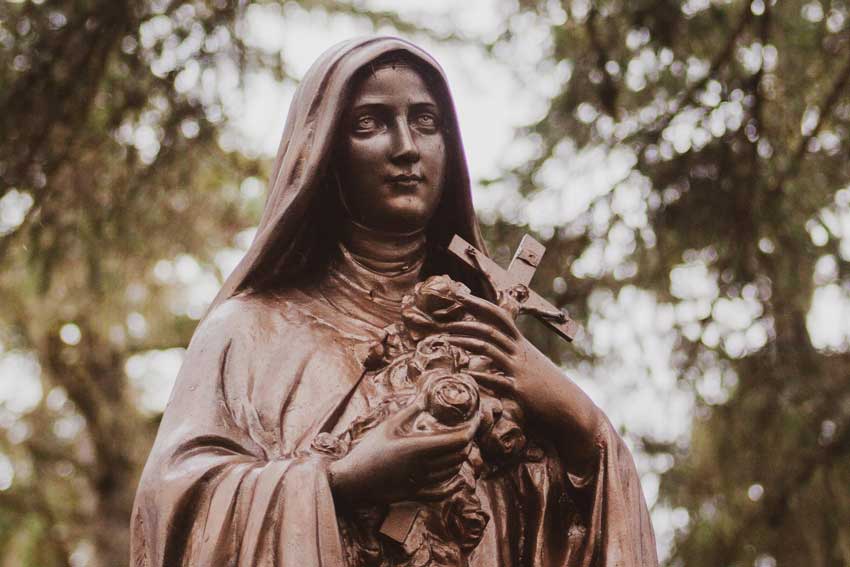
Catholics are weird about their saints, but within reason
Every once in a while, you’ll come across someone who giggles at the Catholic practice of honouring a saint on the day of his death, rather than on the day of his birth. They assume this means that Catholics are creepy and morbid (which, okay, is kind of true) or that Catholics are metal and hardcore (which is also sometimes true). Or that Catholics are just kind of weird (which is definitely true).
Of course the real reason we venerate a saint on the day of his death is that it IS his birth day: The day of his birth into eternal life.
I was thinking of this when someone posted a prayer request for a friend battling cancer. She mentioned the name of the patron saint of cancer patients, and it suddenly occurred to me how strange that is: The patron saint died of cancer, and that’s how she became the one we pray to when we want someone to survive cancer. Kind of weird!

There is not, as far as I can tell, any official system for how a saint acquires patronage, but it’s common for them to become the patron saint of the thing that killed them (or of people dealing with the thing that killed them). They’re often portrayed with the thing that killed them — a wheel, a sword — perhaps giving the impression that that thing is what they set out to make their life about. “Hey, it’s-a me, the axe in the head guy!” they seem to say.
But of course it’s the Catholics left behind after their death who decided that that would be Their Main Thing. This is clearly related to the idea that their feast day is the day they died. If it was cancer that killed them, then cancer is the thing that freed them from mortality and let them enter into eternal life. If it was leprosy that killed them, then leprosy was their ticket to heaven. And so on.
Or is that it? I think this view misses the mark and makes Catholics into the morbid, death-loving ghouls we’re sometimes accused of being. If Catholics were 100 per cent on board with the idea that the thing that kills you is the best thing that ever happened to you, then why would we, for instance, ask the patron saint of cancer patients to intercede for the healing of cancer patient?
Because that is what we do: We don’t pray, “O dear Saint Mervintrude, patron of wheelbarrows, my friend is in the hospital after having been run over by a rogue wheelbarrow. Please let him die soon.” Instead, we pray, “Please restore him to life and health.”

So which is it? Do Catholics yearn for a holy death in the company of saints who also died that way, or do Catholics look for escape from death through the intercession of saints who didn’t escape?
The answer is, of course, both. Or: It depends. Or, when you get right down to it, neither.
It may be more helpful to remind ourselves that saints are not mascots, despite the sort of coded system we use to identify them. They are, as we teach children to know, “holy helpers,” and they are attached, for the purposes of the Church on earth, to certain patronages not because it’s mainly what they were about, but because that’s helpful to us.
But their real attachment was to Christ. That was their “main thing”. Christ is who they looked to in their earthly life, and that’s whose countenance they are now eternally basking in. That’s who, in the particularity of their actual lives, they imitated in life, and whose call they responded to; and that’s who they returned to in death.
So a patron of the poor is someone who was poor, like Christ, or someone who helped the poor, like Christ. A patron of some particular illness is someone who wanted to heal the suffering, like Christ, or someone who accepted suffering, like Christ. A patron of some particular kind of sinner is someone who had pity on people who struggle with sin, like Christ, or someone who, when faced with sin, turned to the Father, like Christ.
Patron saints understand how powerfully consuming some illness or trial or threat can be, and simultaneously have the eternal perspective which makes it shrink down to its proper size. And that’s why it’s completely appropriate to pray to the patron saint of cancer patients, who was killed by cancer, and ask her to intercede for a cancer patient, that she may be healed of cancer: Because when we involve a patron saint, we are by definition involving Jesus.
When we pray for someone to be healed of (for instance) cancer, we are really praying for them to be united with Christ in one way or the other. Prayer is always a kind of surrender, whether we realise it or not. We’re asking the expert on living like Christ to help us live with Christ, and we are, by definition, enlisting their help; and we are, by default, giving over control of what that help may look like, and giving it to Christ.
So there is nothing wrong (or morbid, or backward) about associating certain saints with certain ways of living or certain ways of dying. We live in particularity, not in spiritual abstraction, and it’s comforting and inspiring, and also spiritually efficacious, to call upon a patron saint who has some relevance to the challenge that’s actually in front of us. But the thing that unites all the saints is a love of Christ, and a trust in Christ. When we pray to a saint, we’re asking them to put us in Christ’s hands.
Related:
